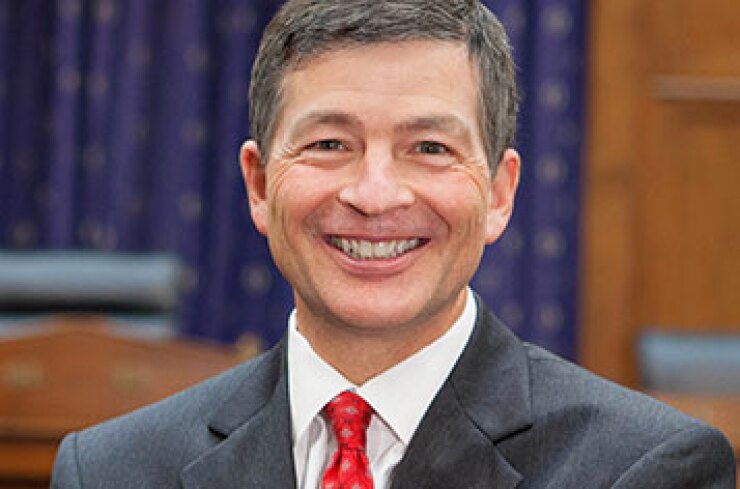
WASHINGTON – Donald Trump's plans to dismantle the Dodd-Frank Act and impose a moratorium on new regulations could affect the municipal bond market.
The president-elect's transition team said on Trump's webpage: "The Dodd-Frank economy does not work for working people. Bureaucratic red tape and Washington mandates are not the answer. The Financial Services Policy Implementation team will be working to dismantle the Dodd-Frank Act and replace it with new policies to encourage economic growth and job creation."
At the same time, Kroll Bond Rating Agency said in a release that it is betting the House will modify and pass the Financial Choice Act (H.R. 5983), which House Financial Services Committee chairman Jeb Hensarling, R-Texas, introduced last September to roll back Dodd-Frank Act and other requirements.
The bill would divert to Treasury funding that the Municipal Securities Rulemaking Board gets from Securities and Exchange Commission and Financial Industry Regulatory Authority sanctions against violators of muni rules. The funding arrangement was set up under Dodd-Frank.
The Act also made non-dealer municipal advisors subject to federal oversight and regulation and extended the MSRB's reach to protecting municipal issuers.
Former SEC Commissioner and Dodd-Frank critic Paul Atkins has been tapped by Trump to lead the transition team's review of independent financial agencies. Nominated by then-President George W. Bush, Atkins was at the SEC from August 2002 to August 2008. He is currently CEO of Patomak Global Partners, which provide consulting and other services in the financial arena.
David Malpass, former chief economist at Bear Stearns and founder and president of Encima Global LLC, an economic, research and consulting firm who sits on the board of UBS Funds, is heading Trump's transition team of economic issues along with Bill Walton, who chairs Rappahannock Ventures, a private equity firm.
A moratorium on new rules could thwart the Municipal Securities Rulemaking Board initiatives on markup disclosure, pre-trade price transparency, and syndicate practices. Dealers have complained about non-stop rules coming out of the MSRB in response to Dodd-Frank and the SEC's 2012 Report on the Municipal Securities Market.
"As of right now, if you look at the types of things that have been impacting the muni market, especially on the retail and regulatory side, they're all born out of the 2012 [report]," said John Vahey, managing director of federal policy for Bond Dealers of America. The report came out of the SEC with bipartisan support, but the expected changeover in the administration raises questions about whether that kind of support will continue, he added.
Vahey said dealers have a bit of regulatory fatigue from the past five years. "Could dealers use a breather from reg compliance changes and time to adapt to a new environment? Yes," Vahey said. "Is there at the same time some potential negatives out there to a regulatory moratorium across the entire economy? Potentially, yeah."
Trump will also have the chance to choose the new SEC chair as well as fill two vacant commission slots. SEC chair Mary Jo White has said she will step down and Congress never confirmed Obama's nominees: Hester Peirce, a senior research fellow and director of the financial markets working group at the Mercatus Center at George Mason University, and Lisa Fairfax, a professor of law at George Washington University.
Matt Fabian, a partner with Municipal Market Analytics, said that it is easy to imagine Trump would appoint industry-friendly individuals to fill the chair and vacant commissioner slots at the SEC.
"It's a very volatile situation right now in terms of myriad policy outcomes from the commission," Vahey said.
Trump's promised moratorium on new regulations comes as the Treasury Department has been hoping to finalize rules on issue price and also press forward with rules on political subdivisions, which have been very controversial in the muni market.
A list of potential cabinet members from Trump's transition team obtained by BuzzFeedNews on Thursday included three names for Treasury Secretary: Hensarling, businessman Carl Icahn and banker and political fundraiser Steven Mnuchin.
Fitch Ratings on Thursday warned: "Trump's Medicaid and trade policy proposals would significantly lower federal transfers to state budgets and could negatively affect economic growth and revenues if they are implemented."
Trump would convert Medicaid funding into a block grant program that would "lead to much lower federal funding to states," the rating agency said.
Uncertainty
There are still many uncertainties surrounding Trump and his proposals and policies.
Fitch Ratings said Trump's policies would be "negative for U.S. public finances" because of uncertainties about the detail of his proposals, the degree to which he'll promote them, and his ability to implement them. Senate Democrats will still be able to filibuster Republican legislation they don't like, the rating agency pointed out.
"The election of a polarizing figure like Trump may put institutional relationships under strain, although his victory will give him some significant political capital," Fitch said.
Earlier this year, Trump suggested he would try to negotiate down the national debt of the U.S., setting the financial markets on edge.
Trump's proposals would contribute $5.3 trillion to the national debt, according to an analysis by the Committee for a Responsible Federal Budget.
A key test for him will be whether to continue to fund the federal government and raise or suspend the federal debt limit, which has been lifted until March 2017.





